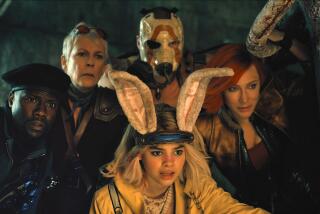Eli Roth: I barely survived Tarantino
- Share via
The scene takes place toward the end of Quentin Tarantino’s rollicking World War II action-drama “Inglourious Basterds.” As fire engulfs a Parisian movie theater packed with German military commanders, pandemonium ensues, diverting attention from the real action: a heart-pounding confrontation between a crack team of Nazi-terrorizing Jewish covert operatives (the so-called “Basterds”) and the Third Reich’s top brass.
It’s vintage Tarantino, hyper-real ultra-violence that arrives as a kind of catharsis after more than two hours of intricate plot twists and baroque dialogue as the Basterds, led by Lt. Aldo Raine (Brad Pitt), do their best to destabilize German forces in Nazi-occupied France through their unique brand of terrorism: collecting the scalps of Hitler’s troops.
But for cast member Eli Roth -- who portrays a merciless, baseball-bat-wielding Nazi killer dubbed “the Bear Jew” by fear-stricken German soldiers in the film, which opens Friday -- the scene is memorable for a different reason.
“We almost got incinerated,” Roth exclaimed during a recent outing to Hollywood’s Amoeba Music, where he was riffling through racks of DVDs. “The fire comes up. They thought it was going to burn at 400 degrees centigrade and it burned at 1,200. That’s like 2,000 degrees Fahrenheit! You see the swastika fall. It was not supposed to. It was fastened with steel cables; the steel liquefied.”
He paused midstory, however, discovering used copies of “Hostel” and “Hostel: Part II,” the films that were produced by his friend and biggest booster Tarantino and cemented Roth’s reputation as one of horror moviedom’s most extreme, successful (and reviled) auteurs. Roth’s primary function is to make films, you see, not act in them (his output as a writer-director-producer even spawned its own sub-category in the genre: “torture porn”). His role in “Inglourious Basterds,” however, is more than simply a glorified cameo. It represents a kind of creative apotheosis in his relationship with his mentor, Tarantino -- a culminant experience that drew upon Roth’s skill set as a filmmaker, his hometown and his religion.
Marveling at his movies’ price tags -- “12 bucks, what a deal!” -- Roth continued his on-set story, explaining that the actor who shared the scene with him, Omar Doom, “had to go to the hospital. I was on the ground, my feet were up, I had ice packs all over me. . . . The fire department said another 10 or 15 seconds, the structure would have collapsed.”
In other words, torture porn’s poster boy -- the filmmaker who committed to celluloid such images as a cheerleader jumping into the air and doing a split onto a gigantic hunting knife -- and the guy who ruthlessly bludgeons, bombs and machine guns every Nazi in his path in “Inglourious Basterds” finally got to taste the pain himself.
“I got torched,” Roth said solemnly.
--
A controversial career
Although Roth will tell you he relishes being a provocateur and enjoys pushing people’s buttons (“I upset people so much they had to create a new genre for me!”), spend an afternoon with him and it becomes abundantly clear that he’s done some thinking about the slagging he’s taken from detractors who say his movies are misogynistic and desensitize viewers to violence, ultimately dismissing Roth as a moronic frat boy.
“When people direct insults at me, I can take it,” the Boston-born New York University grad (and son of a Harvard professor) said later, sipping a protein shake (with extra glutamine). “I’m an easy target. But I know where my stuff comes from.
“I have a strong art-history background,” he continued. “I could discuss all these painters I grew up looking at, authors I read. How there’s far more violence in those works. Why aren’t you upset about that? Instead they write about me, ‘Eli Roth, that fraternity boy.’ People can’t get past the blood.”
Most injurious to Roth -- an amiable, fast-talking workout buff who was voted Men’s Fitness magazine’s “most fit director” in 2006, but who, for the record, has attended precisely one frat party in his life -- is the perception in indie movie circles that he somehow glad-handed his way into Hollywood’s big leagues. “I’ve been making movies since I was 8, working on movies since I was 18, didn’t make my first movie until I was 30 and didn’t even have money until I was 33,” he said. “Then people are like, ‘He got it easy.’ It’s so much easier to think I cheated than to think I worked my ass off.”
Roth’s career began to take off in 2002. After toiling in lowly movie production jobs for a decade, he cobbled together $1.5 million to shoot his debut feature, “Cabin Fever,” a canny horror flick about a group of kids stricken with a flesh-eating virus while vacationing in the woods.
The film was a hit on the festival circuit. When Roth screened it at the Los Angeles Film Festival in 2003, he showed up to the premiere drenched in fake blood in costume as Ichi the Killer, hero of an obscure Japanese crime torture film of the same name. “Cabin Fever’s” crudely compelling aesthetic, as well as the director’s eagerness for self-promotion, were enough to impress Tarantino, who invited Roth to his house after seeing it. “I was like P.T. Barnum,” Roth recalled. “And Quentin loved that about me. He saw a lot of me in him.”
“Cabin Fever” went on to take in $30 million worldwide and an additional $70 million on DVD. Roth was inundated with scripts and considered directing a big-screen adaptation of “Baywatch” (to have been titled “Baywatch 3-Double-D”), among other projects, before he told Tarantino a movie idea he had kicking around about a youth hostel in a foreign country where American tourists are tortured and murdered as sport.
The idea galvanized Tarantino. He signed on as an executive producer on 2006’s “Hostel,” which was billed as “Quentin Tarantino Presents,” helping to propel the $4-million, independently financed film’s worldwide box office to more than $80 million.
That was the start of a beautiful friendship. As Tarantino was working on the script for “Inglourious Basterds,” he would enact scenes for Roth. Admiring his small turn in front of the camera in “Cabin Fever” -- Roth had to fill in for another actor who dropped out -- Tarantino cast him in a cameo in “Death Proof,” the segment he directed in the ‘70s exploitation homage “Grindhouse.” (Roth also directed a now infamous trailer for a faux-horror movie that appears within the movie, “Thanksgiving.”)
“That became my audition for ‘Inglourious Basterds,’ ” Roth recalled.
--
Getting into character
To hear it from Tarantino, however, Roth was not his first choice for the part of Donny Donowitz, a rage- fueled, Boston-born Jewish-American who makes his displeasure toward Nazis known in the movie primarily by dint of a Louisville Slugger to the cranium. “I had actually somebody else in mind,” Tarantino said. “So I was writing for a real Boston guy. And I got to know Eli right before I started writing the script again. Eli is from Boston, and he’s kind of perfect casting. In ‘Death Proof,’ he did my dialogue as good as anybody else in the movie. And he loved the idea of trying his hand at acting and really being a character.”
But before offering him the part, Tarantino urged Roth to start thinking about how to embody Donowitz as a “360-degree character.” Roth agreed and decided to clear his schedule to remain in Germany with Tarantino for the duration of “Basterds’ ” six-month shoot, including Christmas and New Year’s Eve when nearly everyone else went home for the holidays.
“I wanted to be there not just as an actor but as a crew member and as a friend,” Roth said. “It was a great feeling to help him out and pay him back for all he’s done for me.”
As Roth tells it, he also became Tarantino’s “Jewish fact-checker” on the project almost by default. Roth’s input ultimately enabled the writer-director to more imbue “Basterds’ ” resolution with a higher degree of psychological realism. This began with Roth inviting his mentor to his family home for Passover Seder in 2007, Tarantino’s first. “We got into these long, philosophical discussions about the Holocaust and slavery, oppression,” Roth said. “He asked me, ‘Would a Jew give absolution to a Nazi at the end of the war?’ I said, ‘Never.’ It’s purely a Christian construct. It’s not that we don’t forgive; we don’t forget. Being Jewish is to remember. If I had the chance, I would kill every one of those [Nazis].”
He also persuaded Tarantino to let him direct yet another movie-within-a-movie, the Nazi propaganda film called “Nation’s Pride” that follows the exploits of a German army sniper who is key to the plot of “Inglourious Basterds.” Tarantino has historically avoided using a second-unit director and was initially reluctant. But he wanted to finish the movie in time to submit it for the Cannes Film Festival. So he loaned Roth the use of “Basterds” cast member Daniel Bruhl, and Roth cajoled Tarantino into allotting him many more resources than the writer-director had planned to use himself: an eight-man crew, five stuntmen and 20 extras. Naturally, a seven-minute director’s cut of “Nation’s Pride” will be included on the DVD.
The results are typically over-the-top, Roth-style war gore: Bruhl’s character is heroically depicted mowing down hundreds of Allied troops from the safety of a bell tower and carving an ornate swastika onto the floorboards to buck up his courage. “I had so much fun making it,” Roth exclaimed. “But my grandparents must be turning over in their graves.”
He invited his parents to Berlin to take part in filming a scene in which 300 extras dressed in full Nazi regalia attend a screening of “Nation’s Pride.” Never mind that many of his relatives were killed in the Holocaust -- or that his mother and father had previously sworn never to set foot in Germany. Upon landing in Berlin, Roth’s parents visited the Holocaust Museum and changed their stance on modern Germany. On set later in the day, they displayed a willingness to enter into the film’s historical-revisionist fantasy, posing for photos with the actor who portrays Hitler in “Basterds.”
With its shocker ending and high Nazi body count, “Inglourious Basterds” certainly helped Roth live out the stuff of so many Hebrew-school revenge fantasies. And with Tarantino’s encouragement, Roth plans to earmark acting parts for himself in any future films he makes.
“Quentin really pushed me [as an actor]. He said, ‘Now you can write parts for yourself because you went toe to toe with the best. You acted with Brad Pitt and for me and you held the screen. You could have another career if you want,’ ” Roth said with characteristic self-satisfaction, adding that “Inglourious Basterds” remains one of his personal and professional high points.
“I almost died shooting it. But it’s one of the most satisfying, orgasmic things I’ve done in my life,” he said. “It’s kosher porn.”
--
Times staff writer Rachel Abramowitz contributed to this report
More to Read
Only good movies
Get the Indie Focus newsletter, Mark Olsen's weekly guide to the world of cinema.
You may occasionally receive promotional content from the Los Angeles Times.









